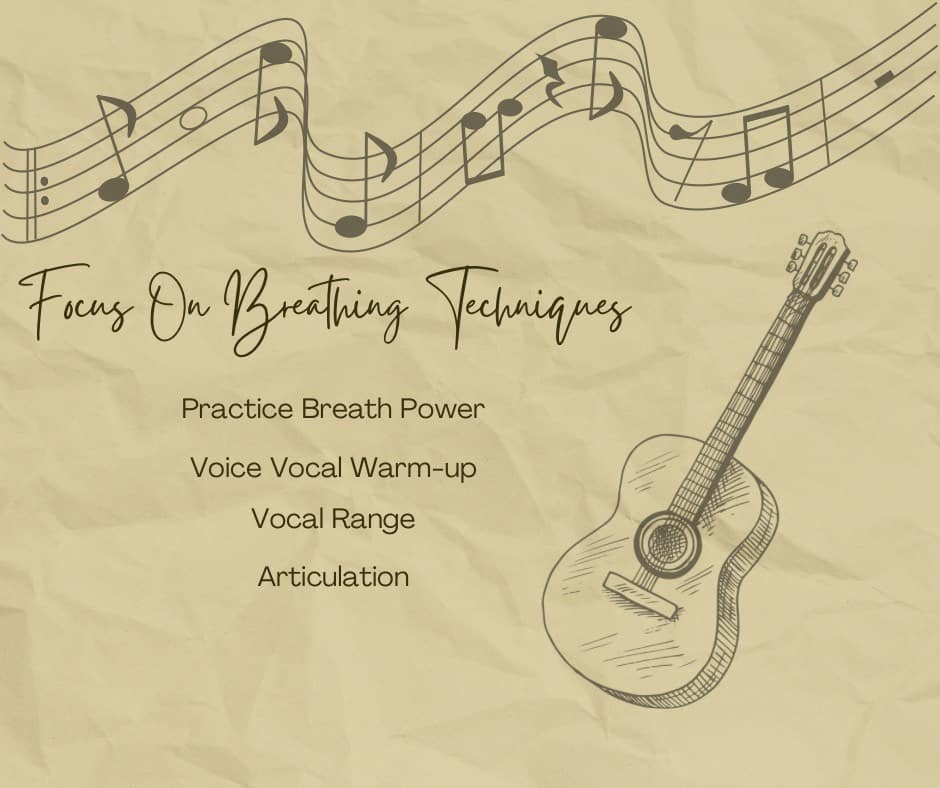Singing Tips for Beginners

Starting your singing journey can feel both exciting and daunting. Whether you dream of performing on stage, recording music, or simply improving your vocal skills, understanding the foundational techniques is essential. For beginners, learning how to sing properly can seem like a challenge, but with the right guidance and practice, you can quickly improve your voice and build confidence.
In this blog post, we’ll explore essential singing tips for beginners that will help you develop a solid foundation. From vocal exercises to breathing techniques, we’ll cover everything you need to get started and grow as a singer. So let’s dive in!
1. Warm Up Your Voice

One of the most important singing tips for beginners is always to warm up your voice before you sing. Just like athletes stretch before exercising, your vocal cords need preparation to avoid strain and injury. Warming up helps improve your range, tone, and flexibility.
Start with simple
vocal warm-up exercises:
- Lip trills: Gently blow air through your closed lips while humming. This helps loosen your vocal cords and prepares your voice for singing.
- Humming scales: Humming is a gentle way to start engaging your vocal cords. Try humming up and down a major scale, increasing in pitch slowly.
- Sirens: This exercise involves sliding your voice up and down from low to high pitches, mimicking the sound of a siren. It helps with flexibility and vocal control.
These basic exercises are perfect singing tips for beginners to get your voice ready for practice or performance.
2. Focus on Breathing Techniques

Proper breathing is a cornerstone of singing. Many beginners overlook how essential breath control is to achieving a strong, consistent voice. Singing tips for beginners often emphasize the importance of diaphragmatic breathing. This technique uses your diaphragm to control airflow, helping you maintain vocal power and stability without straining your throat.
Here’s how to practice breathing from your diaphragm:
- Lie down on your back and place a hand on your stomach. As you inhale, aim to expand your belly rather than your chest. This ensures you’re using your diaphragm, not just shallow chest breathing.
- Practice slow breathing: Inhale for a count of four, hold for four, and exhale for a count of four. This builds breath control over time.
- Breathing exercises: Try breathing in for 4 counts, holding for 4 counts, and exhaling slowly for 8 counts. This helps increase lung capacity and control, which is vital for longer phrases and singing without running out of breath.
Breathing exercises are one of the most crucial singing tips for beginners, as they lay the foundation for power, stamina, and vocal longevity.
3. Develop Proper Posture
Your posture plays a significant role in how well you can sing. Slouching or improper posture can limit your airflow and strain your vocal cords. Good posture allows your diaphragm to expand fully and helps you control your voice better.
Here’s how to improve your posture for singing:
- Stand with your feet shoulder-width apart.
- Keep your shoulders back and relaxed.
- Imagine a string pulling you up from the top of your head, helping you stay tall and aligned.
- Avoid locking your knees and keep a slight bend in them to maintain flexibility.
Proper posture is one of the easiest
singing tips for beginners to implement, and it can dramatically improve your vocal performance.
4. Start with Simple Scales and Vocal Exercises
When starting as a beginner, it’s crucial to master basic scales and vocal exercises. These exercises not only improve your pitch accuracy but also build your vocal range and agility. Singing tips for beginners often include practicing major scales and simple arpeggios to get comfortable with different notes and intervals.
Start with these exercises:
- Major scale: Sing up and down a simple 7-note scale (C-D-E-F-G-A-B-C) to build pitch accuracy and familiarize yourself with basic vocal patterns.
- Arpeggios: Sing the notes of a chord, for example, C-E-G-C-E-G. This helps you with note recognition and vocal control.
Practicing scales and arpeggios regularly will help you develop your ear and voice, and these are singing tips for beginners that you can do daily.
5. Work on Your Pitch Accuracy

One of the most common challenges for beginner singers is staying on pitch. It can be tricky to find and maintain the correct note, but with practice, you’ll get more comfortable.
Singing tips for beginners often focus on ear training and developing pitch accuracy.
Here’s how to improve your pitch:
- Use a piano or tuning app: Play a note on a piano or use a tuning app to help you match the pitch with your voice. This helps you build pitch recognition.
- Record yourself: Recording your voice while singing helps you identify when you’re off-pitch and make adjustments. Listen back critically and try to stay in tune.
- Sing along with a reference track: Sing along with a song or instrumental track to practice staying in tune.
Pitch accuracy is a fundamental skill for any singer, and
singing tips for beginners that involve ear training and pitch practice are key to developing your voice.
6. Use Your Head Voice and Chest Voice
As a beginner, it’s important to learn how to use both your chest voice (the lower register) and your head voice (the higher register). Developing a mix of both will allow you to sing comfortably across your range. These vocal techniques will help you add depth and flexibility to your sound.
Here’s how to work on your head and chest voice:
- Chest voice: To access your chest voice, speak or sing in your lower register. This is the voice you use when talking normally.
- Head voice: To access your head voice, try singing in a higher register, allowing the sound to resonate in your head or nasal area. It will feel lighter and more airy.
- Mixed voice: As you become more comfortable, experiment with blending your chest and head voices to create a smooth transition between registers.
Learning to switch between head voice and chest voice is one of the best singing tips for beginners to improve vocal range and tone quality.
7. Practice Regularly and Be Patient

Becoming a better singer takes time and consistent practice. It’s essential to practice regularly to build vocal strength and technique. Don’t expect overnight results, but with time and dedication, your voice will improve.
Here are some tips for practicing effectively:
- Set a practice schedule: Aim to practice for at least 20-30 minutes a day to build consistency.
- Focus on specific areas: Identify the areas where you need the most improvement (breathing, pitch, range, etc.) and dedicate some time to working on those.
- Take breaks: Don’t overwork your voice. Take breaks during practice to avoid vocal strain and give your voice time to rest.
Patience and consistent practice are key to mastering any skill, and singing tips for beginners emphasize the importance of regular practice.
8. Stay Hydrated and Rested
Taking care of your voice is just as important as practicing. Singing tips for beginners often highlight the need for vocal health, which includes staying hydrated and getting adequate rest. Drinking plenty of water helps keep your vocal cords lubricated and reduces the risk of strain. Additionally, make sure to get enough sleep, as rest is crucial for vocal recovery.
Some additional tips for vocal health:
- Drink room-temperature water (avoid cold or caffeinated drinks, as they can dry out your voice).
- Avoid shouting or straining your voice, especially if you feel tired or hoarse.
- Warm up and cool down your voice before and after practice.
Taking care of your vocal health will ensure you can sing consistently and safely.
Starting your singing journey as a beginner can be challenging, but with the right singing tips for beginners, you can quickly build a solid foundation and improve your vocal skills. Remember to focus on proper warm-ups, breathing techniques, posture, and vocal exercises. Practice consistently and be patient with yourself as you develop your voice.
By following these
singing tips for beginners, you’ll be well on your way to becoming a more confident and skilled singer. Happy singing!
Legendary India Singers
 Starting your singing journey can feel both exciting and daunting. Whether you dream of performing on stage, recording music, or simply improving your vocal skills, understanding the foundational techniques is essential. For beginners, learning how to sing properly can seem like a challenge, but with the right guidance and practice, you can quickly improve your voice and build confidence.
In this blog post, we’ll explore essential singing tips for beginners that will help you develop a solid foundation. From vocal exercises to breathing techniques, we’ll cover everything you need to get started and grow as a singer. So let’s dive in!
Starting your singing journey can feel both exciting and daunting. Whether you dream of performing on stage, recording music, or simply improving your vocal skills, understanding the foundational techniques is essential. For beginners, learning how to sing properly can seem like a challenge, but with the right guidance and practice, you can quickly improve your voice and build confidence.
In this blog post, we’ll explore essential singing tips for beginners that will help you develop a solid foundation. From vocal exercises to breathing techniques, we’ll cover everything you need to get started and grow as a singer. So let’s dive in!
 One of the most important singing tips for beginners is always to warm up your voice before you sing. Just like athletes stretch before exercising, your vocal cords need preparation to avoid strain and injury. Warming up helps improve your range, tone, and flexibility.
Start with simple vocal warm-up exercises:
One of the most important singing tips for beginners is always to warm up your voice before you sing. Just like athletes stretch before exercising, your vocal cords need preparation to avoid strain and injury. Warming up helps improve your range, tone, and flexibility.
Start with simple vocal warm-up exercises:
 Proper breathing is a cornerstone of singing. Many beginners overlook how essential breath control is to achieving a strong, consistent voice. Singing tips for beginners often emphasize the importance of diaphragmatic breathing. This technique uses your diaphragm to control airflow, helping you maintain vocal power and stability without straining your throat.
Here’s how to practice breathing from your diaphragm:
Proper breathing is a cornerstone of singing. Many beginners overlook how essential breath control is to achieving a strong, consistent voice. Singing tips for beginners often emphasize the importance of diaphragmatic breathing. This technique uses your diaphragm to control airflow, helping you maintain vocal power and stability without straining your throat.
Here’s how to practice breathing from your diaphragm:
 One of the most common challenges for beginner singers is staying on pitch. It can be tricky to find and maintain the correct note, but with practice, you’ll get more comfortable. Singing tips for beginners often focus on ear training and developing pitch accuracy.
Here’s how to improve your pitch:
One of the most common challenges for beginner singers is staying on pitch. It can be tricky to find and maintain the correct note, but with practice, you’ll get more comfortable. Singing tips for beginners often focus on ear training and developing pitch accuracy.
Here’s how to improve your pitch:
 Becoming a better singer takes time and consistent practice. It’s essential to practice regularly to build vocal strength and technique. Don’t expect overnight results, but with time and dedication, your voice will improve.
Here are some tips for practicing effectively:
Becoming a better singer takes time and consistent practice. It’s essential to practice regularly to build vocal strength and technique. Don’t expect overnight results, but with time and dedication, your voice will improve.
Here are some tips for practicing effectively:





